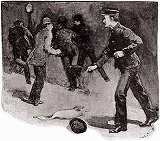“No, no; he found it. Its owner is unknown. I beg that you will look upon it not as a battered billycock but as an intellectual problem. And, first, as to how it came here. It arrived upon Christmas morning, in company with a good fat goose, which is, I have no doubt, roasting at this moment in front of Peterson’s fire. The facts are these: about four o’clock on Christmas morning, Peterson, who, as you know, is a very honest fellow, was returning from some small jollification and was making his way homeward down Tottenham Court Road. In front of him he saw, in the gaslight, a tallish man, walking with a slight stagger, and carrying a white goose slung over his shoulder. As he reached the corner of Goodge Street, a row broke out between this stranger and a little knot of roughs. One of the latter knocked off the man’s hat, on which he raised his stick to defend himself and, swinging it over his head, smashed the shop window behind him. Peterson had rushed forward to protect the stranger from his assailants; but the man, shocked at having broken the window, and seeing an official-looking person in uniform rushing towards him, dropped his goose, took to his heels, and vanished amid the labyrinth of small streets which lie at the back of Tottenham Court Road. The roughs had also fled at the appearance of Peterson, so that he was left in possession of the field of battle, and also of the spoils of victory in the shape of this battered hat and a most unimpeachable Christmas goose.”

“Which surely he restored to their owner?”
“My dear fellow, there lies the problem. It is true that ‘For Mrs. Henry Baker’ was printed upon a small card which was tied to the bird’s left leg, and it is also true that the initials ‘H. B.’ are legible upon the lining of this hat; but as there are some thousands of Bakers, and some hundreds of Henry Bakers in this city of ours, it is not easy to restore lost property to any one of them.”
“What, then, did Peterson do?”
“He brought round both hat and goose to me on Christmas morning, knowing that even the smallest problems are of interest to me. The goose we retained until this morning, when there were signs that, in spite of the slight frost, it would be well that it should be eaten without unnecessary delay. Its finder has carried it off, therefore, to fulfil the ultimate destiny of a goose, while I continue to retain the hat of the unknown gentleman who lost his Christmas dinner.”
“Did he not advertise?”
“No.”
“Then, what clue could you have as to his identity?”
“Only as much as we can deduce.”
“From his hat?”
“Precisely.”
“But you are joking. What can you gather from this old battered felt?”
“Here is my lens. You know my methods. What can you gather yourself as to the individuality of the man who has worn this article?”
I took the tattered object in my hands and turned it over rather ruefully. It was a very ordinary black hat of the usual round shape, hard and much the worse for wear. The lining had been of red silk, but was a good deal discoloured. There was no maker’s name; but, as Holmes had remarked, the initials “H. B.” were scrawled upon one side. It was pierced in the brim for a hat-securer, but the elastic was missing. For the rest, it was cracked, exceedingly dusty, and spotted in several places, although there seemed to have been some attempt to hide the discoloured patches by smearing them with ink.
“I can see nothing,” said I, handing it back to my friend.
“On the contrary, Watson, you can see everything. You fail, however, to reason from what you see. You are too timid in drawing your inferences.”
“Then, pray tell me what it is that you can infer from this hat?”